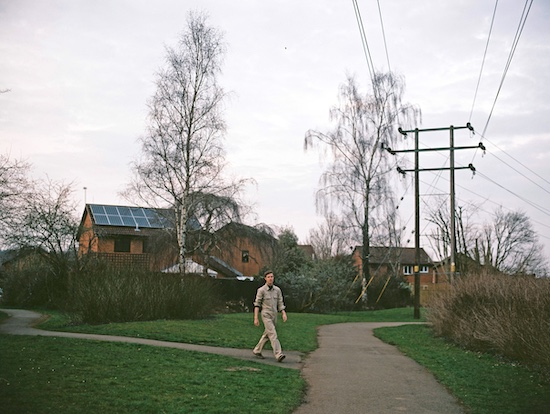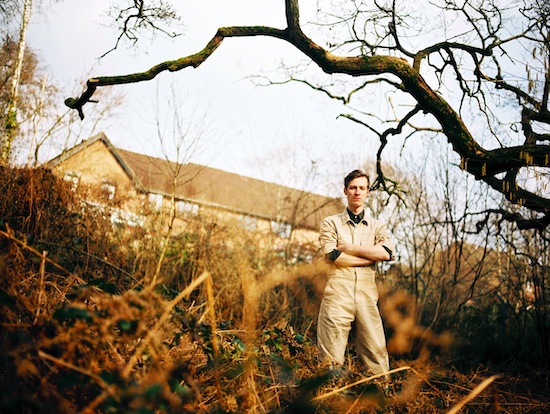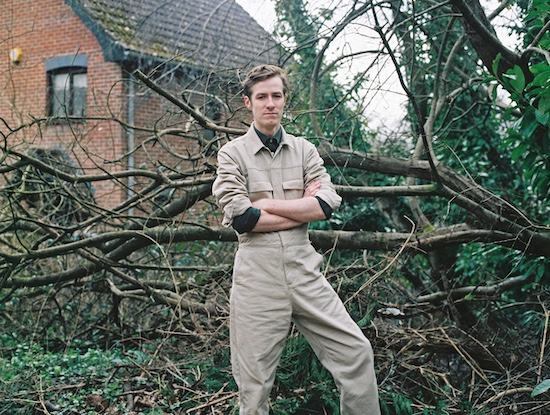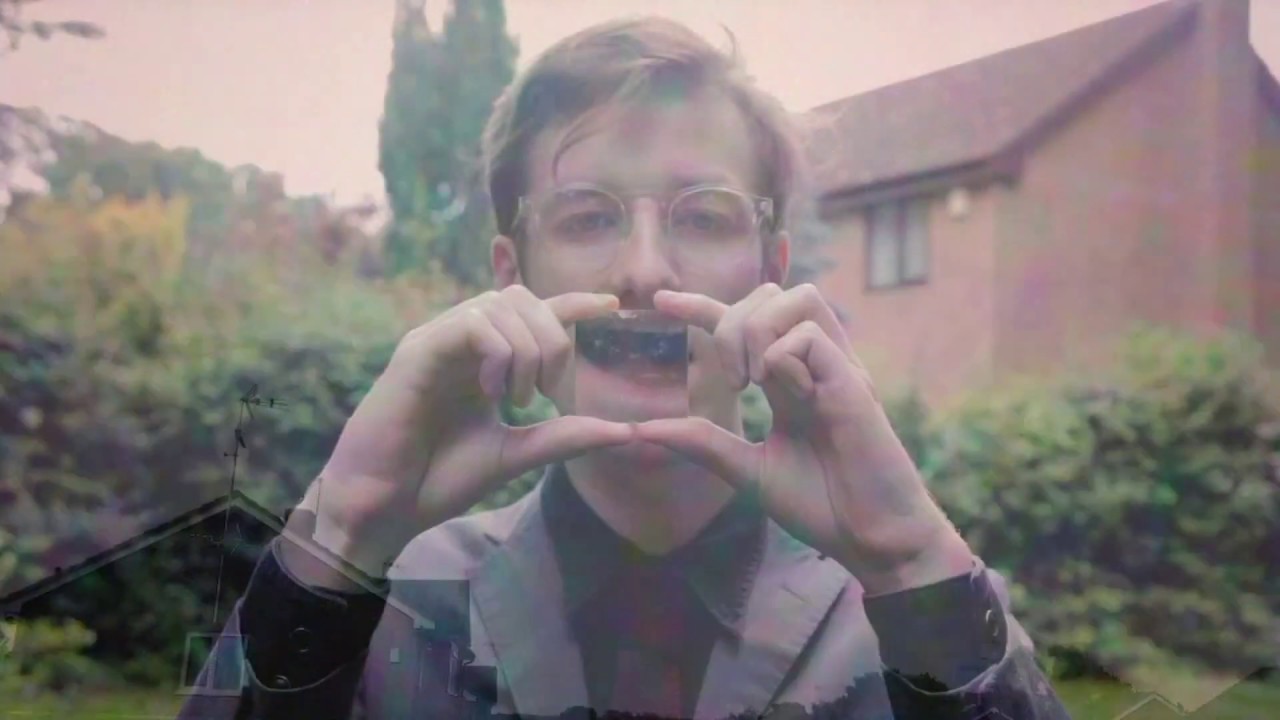On a sunny mid-May afternoon, the quiet streets of Chandler’s Ford, Hampshire are alive with birdsong. Somewhere in the distance roofers yell, a deeper note alongside the shrill squeal from kids playing on an astroturf lawn that surrounds a centuries-old oak in the garden of a chain pub. Pollen floats through the air as a buzzard circles over the secondary school where William Doyle first began to make music.
The 28-year-old musician has returned to the landscape in which he spent his formative years as inspiration for his first album under his own name. After two critically-acclaimed records as East India Youth, (of which the debut Total Strife Forever received a Mercury Prize nomination), new record Your Wilderness Revisited is a giant step forward, an exuberant record shaped by saxophone and thrilled electric guitar, featuring guest spoken word guests by Brian Eno (with whom Doyle has been working for a while) and the broadcaster Jonathan Meades. In many ways it’s the most magnificent realisation yet of the potential that my Quietus co-editor John Doran and I heard when we decided to release Doyle’s first EP Hostel back in the dimly remembered days of 2013. Your Wilderness Revisited is everything I want from a record in so many ways – ambitious, conceptual, loaded with tunes, deeply heartfelt and personal, and sounding unlike anything else around at the moment.
It’s a dramatic shift in aesthetic and atmosphere, one that reflects the circumstances that Doyle found himself in his early teens following the sudden death of his father. This tragedy prompted the upheaval of a move to the suburb of Chandlers Ford, an estate typical of many new developments built during the late 70s and 80s, usually on farmland at the edge of towns. Remember Channel 4 soap opera Brookside? That sort of place. Chandlers Ford is quiet, with houses and flats packed in around short cul-de-sacs that nestle amid ancient woodland, a verdant railway cutting, and a prehistoric settlement. In Doyle’s case, the small house he moved to with his mum might be any other around it, were it not for the trees that reached over the fence and scraped the windows.
Doyle now reflects that this sharp abutment finds its reflection not only in the vivid contrasts of his new record, but having to deal with the shock of grief as a very young man. "There seems to be quite a lot of shifts between styles of music in my work, and I wonder if it’s because of that," he says. "All the changes I’ve had in my life have been not destructive, but very severe, there’s never a slow transition. Maybe that’s why I’ve made this sudden transition between East India Youth and working under my own name, because I’ve found a way of being able to change my circumstances when I wasn’t really enjoying them anymore. That has been influence by this landscape, by that house being right on the edge of the woods. It has a lot to do with the suddenness of grief."
The accident in which his dad died happened when Doyle was 12, and he was home alone when the police came to tell the family the news. "I’ve never really talked to anyone about it, and I think making music has been a way of working through these things", Doyle reflects now. It had been his dad who’d bought him his first electric guitar a few years before his death. It was after that, when he’d moved to the house in Chandler’s Ford, that he began to record music. He also spent hours alone, wandering this strange new landscape that he’d been moved to. "When you’re grieving you’ve got a hole to fill haven’t you, and you try to find that anywhere," he says. "You need to get a perspective – that’s what you’re looking for, perhaps out of an unwillingness to believe that this is your reality now. There’s got to be another way of looking at it, because otherwise you’re confined to the situation, which is so binary."
The roots of Your Wilderness Revisited lie in the period when Doyle wrote his very first songs, one of which was inspired by pylons striding across a golf course that, abandoned, was reverting to woodland and scrub. His plan had been to record and release this music after Total Strife Forever, but there was neither time nor resources to fully realise his vision. "If felt very important to me to do it right, to have the time and space. In some ways I’ve had to go back to square one, which has been very positive."
In this new-found self-confidence, the songs that began to appear were upbeat, exultant even. Given that his early sketches for what the record should be was a critique of the suburb in which he grew up, this came as a surprise. "I was trying to write without prejudice," he remembers. "Whatever came up was whatever I worked on, and it was always major chords, it wasn’t downbeat. That’s when I thought that every time the suburbs are interpreted in an art context it’s ‘oh they’re all the same’, and it became something very different from that. The possibility that you might have some sort of profound experience wasn’t just localised to me, it’s always there."

So what had its roots in a personal attempt to deal with loss became something much broader, an examination into the context he’d ended up living in, and which had changed his life. Doyle emailed developers to ask who designs these estates and how, and what their methodologies might be, but answer came there none. "It feels very secretive to me,’" he says, "I went to a housing exhibition at RIBA and one of the statistics was that only six per cent of the houses built in England are designed by architects. There’s not been any architectural innovation from a certain point onwards – you could probably get a builder to do it because it’s been done so many times. Given that these are places that shape people’s lives this is where the more angry part of the project comes to the fore. How can you deal with people like that? When you think of the big developers it’s all about profit margins, and that’s hard to deal with in any context, let along when you’re dealing with the foundation of people’s lives’
It’s not the front of the houses, that present to the street, that are the significant places to Doyle, but the backs, where the intensity of family life spills from doors onto patios and small lawns. "That’s where you’ve lived your lives, the front is a transition between inside and outside unless yo’ve got a massive front garden, in which case this record probably isn’t about what you know, but it was emotional to look through the trees and see the back of the house and imagine me in my room making music."
Doyle’s home as a teenager could have been built in any estate in England of the time, but is brushed by ancient trees and overhung by shrubs. It’s a sharp dividing line between the domestic and arboreal. "There’s no blurred line at all," says Doyle, "I hate it when people go on about edgelands and the liminal". Rather than this fusty brew from the battered and tired thermos of pyschogeography, Your Wilderness Revisited is utopian, dreamy, positivist, loaded with an atmosphere of positive transformation. "One day I went out I didn’t follow the usual routes that I’d done, but gone to a bit of town that I didn’t really know or have any reason for going to other than walking, but then I came back to my room and felt like everything had moved by half an inch, that sense of newness upon returning to a place I knew well just because I’d gone the same distance somewhere else, that’s the psychedelic thing, and that’s what taking psychedelics is like." This is reflected in just how startlingly joyous the music feels. "There needs to be a celebration happening," Doyle says. "The first half of the album is quite jubilant at times, ‘Millersdale’ has the free jazz bit and it’s very uplifting; ‘Design Guide’ especially is too. It would have been very easy for me to look at it in a negative way, but I chose not to".

So Doyle found the glorious in these places otherwise written off as mundane, celebrating the lives of those within them ignored by art and culture. "When we’re talking about the suburbs it’s always looking outwards and up the train tracks to the big cities, but this wasn’t it, it was always much more inwards, not a feeling of wanting to transcend, but sinking into it," he says. He sees this in part as an exploration of a parallel frustration that these are topographies seen as inferior to the sentimentalised landscapes of the non-urban world: "You’re sold this lie that you can get this breadth of experience through mountains and nature, and while that is great, so are avenues and cul-de-sacs. The promised land doesn’t have to be the Lake District, the Rockies or Alps, but a coppice in the middle of a suburban estate – it can be down the road." Similarly, he insists that this isn’t a record about nostalgia, and is critical of the archive footage and jumpers for goalposts mode of artistic practice that one sees a lot of these days. "It assumes a shared lived experience, it wants people to think ‘I know that, I recognise that in myself’, and in a way I want that to be the case in my record, but I know it’s not," he says. "I don’t think anyone else will think of the psychedelic possibility of this place. I want to introduce this as an idea to people, rather than call back to it. It’s not about ‘wasn’t it great when we were young and going around on our bikes’, that stuff doesn’t matter. All of the revelations I had about place and my role in that were based in solitude, it wasn’t a golden summer, a nostalgia era in my head. So rather than get people on that level I wanted to introduce the idea that this was a way I dealt with my surroundings and learned a lot about life, myself and my sensibilities, and through revisiting. I could have moved on and continued the trajectory of my life, but it wasn’t until I wanted to make a piece about the experience of living in this sort of place that I realised how fundamental it was for me".
Your Wilderness Revisited’s intense evocation of the psychedelic experiences he felt walking through Chandlers Ford is described by William Doyle as being the most personal music he’s ever made, the story of his journey to finding a new sense of self in music as recovery from grief. "This record isn’t about my dad, that’s part of the overall," he says. "It’s about that but also these places, architecture, asserting my identity as William Doyle after East India Youth, it can be all those things, I’m always looking for that multiplicity."
William Doyle’s Your Wilderness Revisited is out now, for more information visit his website



